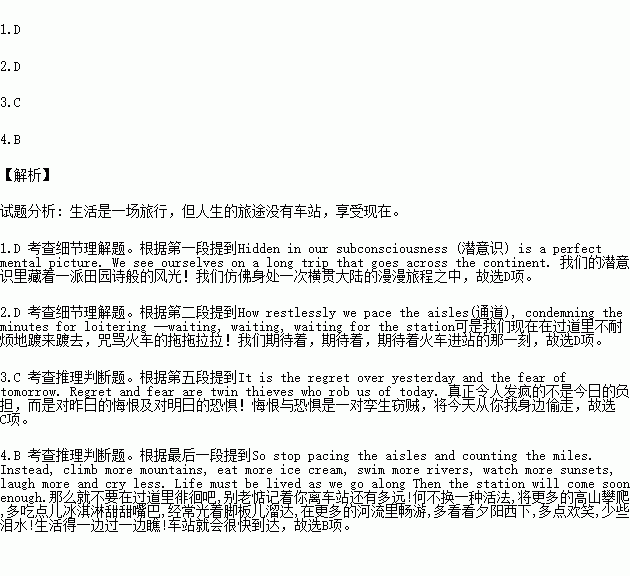题目内容
Hidden in our subconsciousness (潜意识) is a perfect mental picture. We see ourselves on a long trip that goes across the continent. We are traveling by train. Out the windows, we think in the passing scene of cars on nearby highways, of children waving at a crossing, of cattle feeding on a distant hillside, of smoke pouring from a power plant, or row upon row of corn and wheat, of flat lands and valleys, of mountains and rolling hills, of city skylines and village halls.
But uppermost in our minds is the final destination. On a certain day at a certain hour, we will pull into the station. Bands will be playing and flags waving. Once we get there, so many wonderful dreams will come true and the pieces of our lives will fit together like a completed jigsaw(拼图玩具) puzzle. How restlessly we pace the aisles(通道), condemning the minutes for loitering --waiting, waiting, waiting for the station.
“When we reach the station, that will be it!” we cry. “When I’m 38.” “When I buy a new 450SL Mercdes Benz!” “When I put the last kid through college.” “When I have paid off the loan!” “When I get a promotion.” “When I reach the age of retirement, I shall live happily ever after! ”
Sooner or later, we must realize there is no station, no one place to arrive at once and for all. The true joy of life is the trip. The station is only a dream. It constantly outdistances us.
“Relish(appreciate) the moment” is a good motto, actually it isn’t the burdens of today that drive man mad. It is the regret over yesterday and the fear of tomorrow. Regret and fear are twin thieves who rob us of today.
So stop pacing the aisles and counting the miles. Instead, climb more mountains, eat more ice cream, swim more rivers, watch more sunsets, laugh more and cry less. Life must be lived as we go along. Then the station will come soon enough.
1.Why does the author describe the mental picture?
A.To lead us into a perfect world.
B.To let people enjoy the scenery.
C.To introduce an actual trip of his.
D.To compare it to our life’s journey.
2.How do people feel when they’re on their trip?
A.Puzzled. B.Happy. C.Relaxed. D.Impatient.
3.What does the author mean by “Regret and fear are twin thieves who rob us of today” in Line 2 Paragraph 5?
A.Regret and fear are responsible for the loss of today.
B.We must be careful of the two thieves: regret and fear.
C.regret and fear stop us from enjoying our present life.
D.We’re frequently challenged by the two : regret and fear.
4.Why does the author write the passage?
A.To teach us a good lesson.
B.To tell us the right attitude to life.
C.To advice us to forget our worries.
D.To stop us wandering along the aisles.
 口算题天天练系列答案
口算题天天练系列答案书面表达
下列表格为某市2005年与2015年人们度假方式的情况比较,请按表格内容写一篇120词左右的短文,并对度假方式变化原因加以简要评析。
年度 | 2005 | 2015 | 原因 |
境外旅游 | 11% | 22% | 收入增加 |
海边度假 | 38% | 31% | 海水污染 |
爬山野营 | 11% | 34% | 回归自然 |
注意:1.词数100左右。
2. 可以适当增加细节,以使行文连贯。
3. 开头和结尾已给出,不计入总词数。
The way people spend their holidays changed a lot from 2005 to 2015.
_____________________________________________________________________________
_____________________________________________________________________________
_____________________________________________________________________________


 ),并在其下面写出该加的词。删除:把多余的词用(\)划掉。
),并在其下面写出该加的词。删除:把多余的词用(\)划掉。